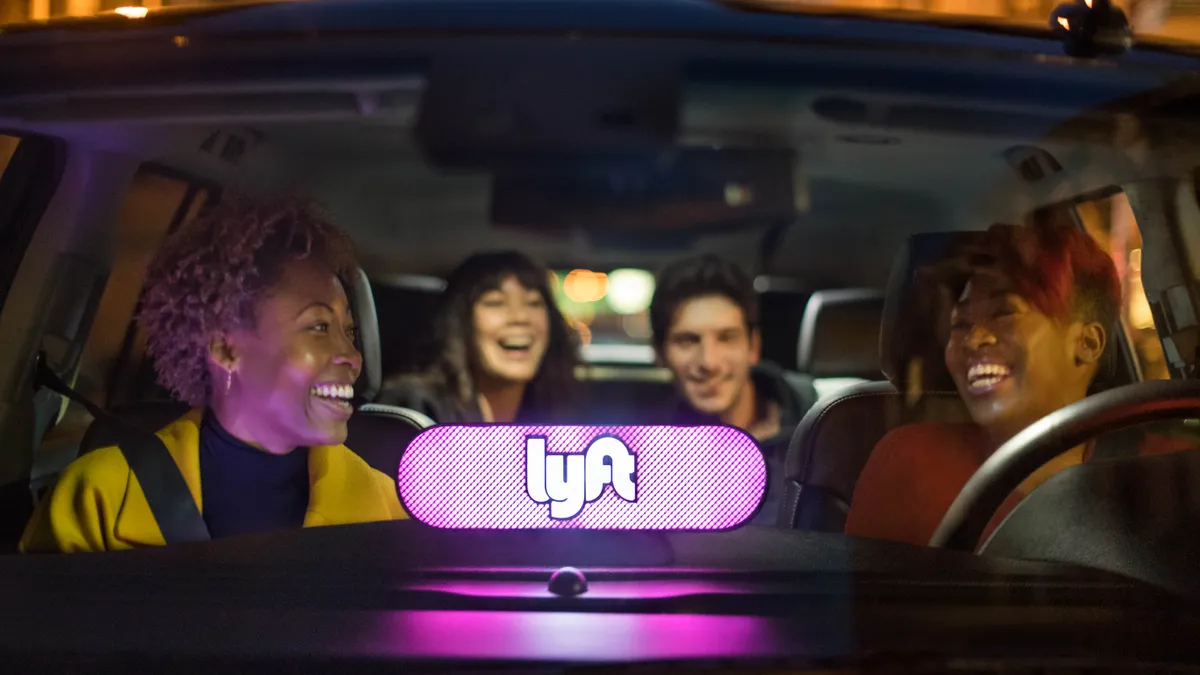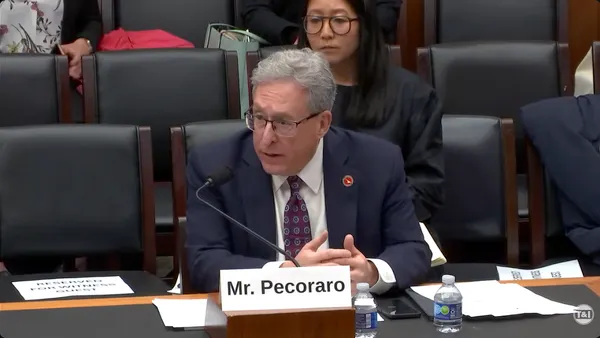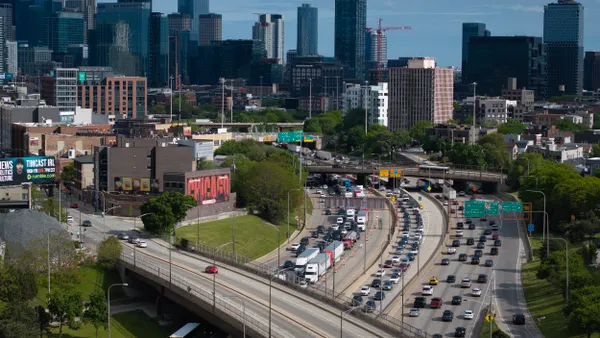UPDATE: June 21, 2022: On June 14, the Massachusetts Supreme Judicial Court ruled that two ballot initiatives to classify app-based drivers as independent contractors could not be placed on the November ballot. In a unanimous decision, the court held that the initiatives included disparate and unrelated policy changes. One version would have required paid occupational safety training before a driver could use a company's platform or mobile application.
The ruling is a setback for DoorDash, Instacart, Lyft, Postmates and Uber, all of which supported the initiatives. A statement from Flexibility and Benefits for Massachusetts Drivers, the coalition behind the proposed measures, said: “The future of these services and the drivers who earn on them is now in jeopardy, and we hope the legislature will stand with the 80% of drivers who want flexibility and to remain independent contractors while having access to new benefits.”
Dive Brief:
- Ride-hailing and delivery companies are preparing for another fight over the classification of their workers as independent contractors, rather than as employees, this time in Massachusetts.
- With echoes of Proposition 22 in California, which passed last year and survived a court challenge, companies including Lyft, Uber and DoorDash filed a petition Tuesday as the Massachusetts Coalition for Independent Work for a ballot initiative in Massachusetts in November 2022. The coalition said the initiative would provide for a minimum earnings guarantee and health and other benefits, while protecting their flexibility as independent contractors. But it is already receiving pushback from a worker group.
- The proposed ballot initiative was created in response to a lawsuit filed by Massachusetts Attorney General Maura Healey last year to force Uber and Lyft to treat drivers as employees. The coalition said a recent survey it conducted of drivers and delivery workers showed 83% support for the ballot measure. The scope of the survey is unknown.
Dive Insight:
California passed Proposition 22, which created a separate classification in state labor law for delivery and ride-hailing drivers to stay as independent contractors rather than be classified as employees, with 58% of the vote last year. At the time, experts said it could encourage copycat efforts in other states by Uber, Lyft and their peers as gig economy companies seek to solidify their workers' status as independent contractors and fight back against regulatory efforts.
An effort by state lawmakers in New York to regulate the industry has stalled, but Healey has taken matters into her own hands with the Massachusetts lawsuit. The lawsuit describes Uber and Lyft's bargaining power with their drivers as "inherently unequal," and says the arrangement violates a state law that prevents the misclassification of independent contractors.
Healey argued in the lawsuit that "drivers are more akin to limousine drivers who use their own vehicles to provide pre-arranged rides through the companies that employ them and share a percentage of the customer's fare with the drivers, rather than bona fide independent entrepreneurs with the ability to grow their businesses based on their individual abilities by effectively marketing and offering their services to the general public."
This effort to put an initiative on the ballot would look to change state law to maintain the flexibility of independent contractor status while guaranteeing certain benefits. The Massachusetts Coalition for Independent Work said the minimum wage guaranteed by the measure would be equal to 120% of the Massachusetts minimum wage, which will be $18 per hour in 2023 from app-based platforms, before customer tips.
Drivers would keep 100% of their tips and be guaranteed at least 26 cents a mile to cover vehicle maintenance and gas, while companies would also be required to pay health care stipends for drivers who work at least 15 hours per week.
During Lyft's second quarter earnings call on Tuesday, company president and co-founder John Zimmer said they are following through on what drivers throughout the country have called for.
"While our priority is to find a legislative solution in Massachusetts, this is part of our continued efforts to advocate what the vast majority of drivers want: the flexible earning opportunities our platform provides, plus new benefits," Zimmer said. "While we are pursuing the ballot option, we are also closely engaged with the Massachusetts state legislature and are continuing to work with them on a potential legislative solution."
Uber CEO Dara Khosrowshahi echoed those sentiments during his company's second quarter earnings call on Wednesday, saying Proposition 22 has "proven to be incredibly popular with California drivers."
Not everyone is on board with the proposed ballot measure, however. The Coalition to Protect Workers' Rights criticized the plan, and the amount of money gig economy companies are expected to spend to promote it to voters. They spent upward of $200 million on Proposition 22 in California and, the coalition said, it expects to spend around $100 million in Massachusetts.
And the coalition argued that "extensive loopholes" mean the guaranteed minimum wage is far lower than advertised, and tout a study from the University of California, Berkeley Labor Center that found that Prop 22 only guaranteed a minimum wage of $5.64 an hour for drivers in California.
"The ballot language from Uber and Lyft is a $100 million ploy to avoid paying taxes, avoid paying workers fairly, and allow Big Tech companies to buy their way out of the basic obligations of every other business," Beth Griffith, an Uber driver and spokesperson for the coalition, said in a statement. "Drivers and delivery workers, most of us Black, Brown and immigrants, are tired of being treated like 'second class' workers by these multi-billion dollar tech companies. When we ask these companies to simply follow the law, they threaten our jobs."












